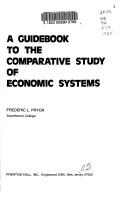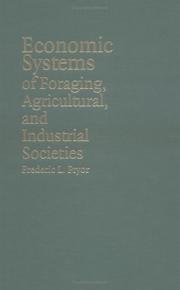| Listing 1 - 10 of 25 | << page >> |
Sort by
|

ISBN: 0253346215 9780253346216 Year: 1973 Volume: 7 Publisher: Bloomington Indiana university press
Abstract | Keywords | Export | Availability | Bookmark
 Loading...
Loading...Choose an application
- Reference Manager
- EndNote
- RefWorks (Direct export to RefWorks)
Economic order --- Property. --- Industrial organization --- Comparative economics. --- Comparative organization. --- 658.11:330.342 --- 658.11:330.342.141 --- Comparative economics --- Comparative organization --- -Property --- Property --- Economics --- Possession (Law) --- Things (Law) --- Wealth --- Industries --- Organization --- Industrial concentration --- Industrial management --- Industrial sociology --- Organizational sociology --- Comparative economic systems --- Economics, Comparative --- Economic policy --- Kinds and forms of enterprise-:-Economische ontwikkeling. Groeistadia --- Kinds and forms of enterprise-:-?330.342.141 --- Law and legislation --- 658.11:330.342.141 Kinds and forms of enterprise-:-?330.342.141 --- 658.11:330.342 Kinds and forms of enterprise-:-Economische ontwikkeling. Groeistadia --- Primitive property --- Industrial organization - Communist countries.

ISBN: 0133688534 Year: 1985 Publisher: Englewood Cliffs, N.J.
Abstract | Keywords | Export | Availability | Bookmark
 Loading...
Loading...Choose an application
- Reference Manager
- EndNote
- RefWorks (Direct export to RefWorks)
Economic order --- Comparative economics --- Comparative economics. --- 330.34 --- Comparative economic systems --- Economics, Comparative --- Economic policy --- Economics --- Economische ontwikkeling. Regionale economische ontwikkeling --- 330.34 Economische ontwikkeling. Regionale economische ontwikkeling
Book
ISBN: 0125666500 9780125666503 Year: 1977 Publisher: New York (N.Y.): Academic press
Abstract | Keywords | Export | Availability | Bookmark
 Loading...
Loading...Choose an application
- Reference Manager
- EndNote
- RefWorks (Direct export to RefWorks)
Economic order --- Economic anthropology --- Anthropologie économique --- 330.123.6 --- 658.81 --- 330.1 --- economie --- Commerce, Primitive --- Economics, Primitive --- Economics --- Ethnology --- Collectieve goederen. Dienstverlening --- Sales organization --- Economische grondbegrippen. Algemene begrippen in de economie --- Economic anthropology. --- 330.1 Economische grondbegrippen. Algemene begrippen in de economie --- 658.81 Sales organization --- 330.123.6 Collectieve goederen. Dienstverlening --- Anthropologie économique

ISBN: 0521849047 0521613477 1107141214 1280422378 0511171269 0511196962 0511298374 0511754302 0511081944 0511082398 9780521613477 9780521849043 9780511082399 9780511754302 9781280422379 9781107141216 9780511171260 9780511196966 9780511298370 9780511081941 Year: 2005 Publisher: Cambridge Cambridge university press
Abstract | Keywords | Export | Availability | Bookmark
 Loading...
Loading...Choose an application
- Reference Manager
- EndNote
- RefWorks (Direct export to RefWorks)
Drawing upon the disciplines of economics, anthropology, statistics, and history, and employing a new and unified analytic approach, Frederic L. Pryor reformulates in this book the entire field of comparative economic systems. He examines large samples of foraging (hunting, gathering and fishing), agricultural, and industrial economies to explore four key questions: What are the distinct economic systems found in each group? Why do certain societies or nations have one economic system rather than another? What impact do economic systems have on the performance of the economy? How do these economic systems develop and change? The results provide a context that allows us to move beyond the chaos of case studies and ideological assertions to gain an overview of the development of economic systems over the millennia. It also raises a series of new analytic and empirical issues that have not hitherto been systematically explored.

ISBN: 0521813581 9780521813587 Year: 2002 Publisher: Cambridge Cambridge University
Abstract | Keywords | Export | Availability | Bookmark
 Loading...
Loading...Choose an application
- Reference Manager
- EndNote
- RefWorks (Direct export to RefWorks)
Capitalism --- Capitalisme --- United States --- Etats-Unis --- Economic conditions --- Conditions économiques --- US / United States of America - USA - Verenigde Staten - Etats Unis --- 331.00 --- 331.068 --- 331.04 --- 330.52 --- Economische bewegingen: algemeenheden. --- Futurologie. --- Langdurige bewegingen. --- Liberaal systeem. Neo-liberalisme. Theorie van de onderhandeling. --- Conditions économiques --- Liberaal systeem. Neo-liberalisme. Theorie van de onderhandeling --- Langdurige bewegingen --- Futurologie --- Economische bewegingen: algemeenheden --- Capitalism - United States --- United States - Economic conditions - 1981-2001 --- United States - Economic conditions - 2001-2009
Book
ISBN: 0691042993 1306985714 Year: 1992 Publisher: Princeton Princeton university press
Abstract | Keywords | Export | Availability | Bookmark
 Loading...
Loading...Choose an application
- Reference Manager
- EndNote
- RefWorks (Direct export to RefWorks)
Agriculture and state --- Collectivization of agriculture --- Communism and agriculture --- 330.342.15 --- 631.115.6 --- Agriculture and communism --- Agriculture --- 330.342.15 Centraal geleide economie. Socialistische economie. Communistische economie --- Centraal geleide economie. Socialistische economie. Communistische economie --- 631.115.6 Collective farms --- Collective farms --- Agricultural collectivization --- Collective farming --- Collectivisation of agriculture --- Land, Nationalization of --- Agrarian question --- Agricultural policy --- State and agriculture --- Economic policy --- Land reform --- Government policy --- Communism and agriculture. --- Social Sciences and Humanities. Agricultural Economics --- Agricultural Policy.
Book
ISBN: 9780521190206 9780511760853 9781107616356 9780511789892 0511789890 9780511787287 0511787286 051176085X 0511850476 1107203864 128277137X 9786612771378 0511789157 051178614X 0511788428 0521190207 1107616352 Year: 2010 Publisher: Cambridge Cambridge University
Abstract | Keywords | Export | Availability | Bookmark
 Loading...
Loading...Choose an application
- Reference Manager
- EndNote
- RefWorks (Direct export to RefWorks)
"Capitalism Reassessed provides a broad view of different types of advanced capitalist economic systems. It is based on an empirical analysis of twenty-one OECD nations. The book looks at the reasons capitalism developed in Western Europe rather than elsewhere and shows the ways in which cultural systems closely infl uence economic systems. The analysis compares the economic and social performance of different capitalist economic systems along a variety of economic and social criteria. It also analyzes how capitalism will change in the twenty-fi rst century. The appendices referred to in the book may be found at: www. swarthmore.edu/SocSci/Economics/fpryor1"--Provided by publisher.
Economic order --- Capitalism --- 330.52 --- 338.313 --- AA / International- internationaal --- Market economy --- Economics --- Profit --- Capital --- Liberaal systeem. Neo-liberalisme. Theorie van de onderhandeling --- Kapitalisme --- Business, Economy and Management
Book
ISBN: 9781400862795 1400862795 Year: 2014 Publisher: Princeton, NJ
Abstract | Keywords | Export | Availability | Bookmark
 Loading...
Loading...Choose an application
- Reference Manager
- EndNote
- RefWorks (Direct export to RefWorks)
Reorganizing the agricultural sector into large-scale state and collective farms was the most radical transformation of economic institutions implemented by Marxist governments. Frederic Pryor provides perspective on this unique experiment by comparing in a systematic and original fashion the changes in the organization of agriculture in all of the world's Marxist nations. This approach allows not only a clearer understanding of the major lines of agricultural policy and organization in these nations but also a keener insight into the reasons underlying the variations among them. What have been the doctrinal elements that have led to collectivization? Why has the process of collectivization been so different in various nations? How have the farms been organized, both internally and within the larger economy? How has the performance of agriculture differed between the various Marxist nations and comparable capitalist nations? And what are the difficulties in reversing collectivization and moving back toward private agriculture? In answering these questions, The Red and the Green draws on a vast number of primary and secondary sources from many nations, as well as from extensive interviews with farmers, agricultural officials, and specialists in more than a dozen Marxist nations. Among books dealing with problems of communist economy, this study is unrivaled in its broad scope, combined with careful institutional and statistical analysis.Originally published in 1992.The Princeton Legacy Library uses the latest print-on-demand technology to again make available previously out-of-print books from the distinguished backlist of Princeton University Press. These editions preserve the original texts of these important books while presenting them in durable paperback and hardcover editions. The goal of the Princeton Legacy Library is to vastly increase access to the rich scholarly heritage found in the thousands of books published by Princeton University Press since its founding in 1905.
Agriculture and state -- Communist countries. --- Collectivization of agriculture -- Communist countries. --- Communism and agriculture. --- Communism and agriculture --- Collectivization of agriculture --- Agriculture and state --- Political Science --- Law, Politics & Government --- Socialism, Communism & Anarchism --- Agrarian question --- Agricultural policy --- Agriculture --- State and agriculture --- Economic policy --- Land reform --- Agricultural collectivization --- Collective farming --- Collectivisation of agriculture --- Land, Nationalization of --- Collective farms --- Agriculture and communism --- Government policy

ISBN: 0521550971 0521559243 1139174606 9780521559249 9781139174602 9780521550970 Year: 1996 Publisher: Cambridge Cambridge University Press
Abstract | Keywords | Export | Availability | Bookmark
 Loading...
Loading...Choose an application
- Reference Manager
- EndNote
- RefWorks (Direct export to RefWorks)
In this book, Frederic L. Pryor uses the concept of structural complexity to show how changes in the population, the labour force, the structure of industry, the financial system, foreign and domestic trade, and the government sector are related to the same general trend in the US economic system. He also investigates the impact of these changes on the functioning of the system, exploring such matters as the long-term rising unemployment rate, the allegedly increasing volatility of the economy, the changing degree of competition, and the evolving economic role of the government. The discussion is aimed at those who wish to view the economy as a whole and who are concerned with problems of understanding an economy that is becoming increasingly complex along many different dimensions. For specialists a number of appendices discuss a variety of technical issues.
Economic conditions. Economic development --- United States --- Business, Economy and Management --- Economics --- Economic forecasting --- Economic indicators --- Organizational change. --- Change, Organizational --- Organization development --- Organizational development --- Organizational innovation --- Management --- Organization --- Manpower planning --- Economic conditions --- Economic forecasting - United States. --- Economic indicators - United States. --- United States of America
Book
Year: 1968 Publisher: London: Allen and Unwin,
Abstract | Keywords | Export | Availability | Bookmark
 Loading...
Loading...Choose an application
- Reference Manager
- EndNote
- RefWorks (Direct export to RefWorks)
| Listing 1 - 10 of 25 | << page >> |
Sort by
|

 Search
Search Feedback
Feedback About UniCat
About UniCat  Help
Help News
News